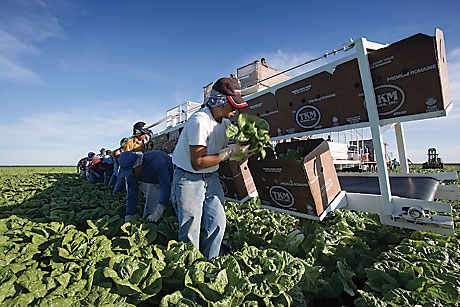Inside a Silicon Valley company’s windowless vault, massive servers silently monitor millions of heads of lettuce from the time they are plucked from the dirt to the moment the bagged salad is scanned at the grocery checkout counter.
That trail can be traced in seconds, thanks to tiny high-tech labels, software programs and hand-held hardware. Such tools make it easier for farmers to  locate possible problems — a leaky fertilizer bin, an unexpected pathogen in the water, unwashed hands on a factory floor — and more quickly halt the spread of contaminated food.
locate possible problems — a leaky fertilizer bin, an unexpected pathogen in the water, unwashed hands on a factory floor — and more quickly halt the spread of contaminated food.
The Los Angeles Times reports this Dole Food Co. project and similar efforts across the country represent a fundamental shift in the way that food is tracked from field to table. The change is slow but steady as a number of industry leaders and smaller players adopt these tools.
Much of the farming community has yet to follow suit, and federal food-safety legislation is stalled in Congress. But proponents of this digital transformation said it was inevitable given public outrage over the recent egg contamination scandal. They said technology could simplify the nation’s complex food-safety system, helping prevent or contain the harm caused by recalled food.
Trace-back systems are similar to how FedEx tracks its packages. On the farm, animals and crop sections are given a "smart" label with a unique identifying  number. The label is attached to a bin, crate or container used for transport.
number. The label is attached to a bin, crate or container used for transport.
Workers then use a hand-held computer or smart phone to scan the labels and record key information, such as date, time, location, workplace temperature and which truck hauled the food. The information is usually uploaded to a database, where it is stored and can be accessed via the Web.
Each time the food moves or is handled by someone new, the data can be updated.
